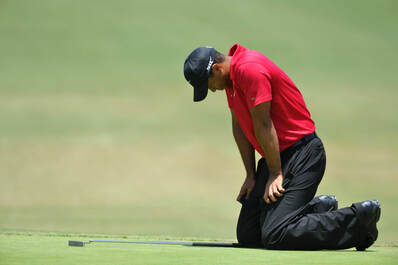Dealing with Golf Post Round Soreness

As I've gotten older one of the things that stands out to me about my golf game is how sore I am after a round. Even when I warm up properly and it is a warm day, I can be sore for hours after playing.
I've gone down a path of working to improve my flexibility and having a PT review of where I might need to improve mobility or strength, but I am still dealing with post-round soreness.
In doing some research, I am finding a number of things that can cause you to be sore after golfing - or even from a range session hitting on golf mats:
To reduce the risk of muscle soreness after golfing, it's a good idea to warm up properly before your round, use proper technique, and maintain good physical condition.
If you are still sore after a round of golf, you can try using ice or a cold compress to reduce inflammation and swelling, and stretching to help reduce muscle soreness.
Keep in mind, this is different than recovering from a golf injury. You should consult a doctor if you are injured.
Here are a few tips for recovering faster from a round of golf:
By following these tips, you can help your body recover more quickly after a round of golf and be ready to play your best the next time you hit the course.
I've gone down a path of working to improve my flexibility and having a PT review of where I might need to improve mobility or strength, but I am still dealing with post-round soreness.
In doing some research, I am finding a number of things that can cause you to be sore after golfing - or even from a range session hitting on golf mats:
- Muscular fatigue: Golfing can be physically demanding, especially if you are not used to it. Swinging a club repeatedly and walking long distances can lead to muscular fatigue, which can cause soreness.
- Poor technique: If you are using poor technique while golfing, it can lead to muscle imbalances and overuse injuries, which can cause soreness.
- Poor conditioning: If you are not in good physical condition, you may be more prone to muscle soreness after golfing.
- Cold weather: Golfing in cold weather can cause muscles to tighten, leading to soreness.
- Lack of warm-up: Failing to warm up properly before a round of golf can increase your risk of muscle soreness.
To reduce the risk of muscle soreness after golfing, it's a good idea to warm up properly before your round, use proper technique, and maintain good physical condition.
If you are still sore after a round of golf, you can try using ice or a cold compress to reduce inflammation and swelling, and stretching to help reduce muscle soreness.
Keep in mind, this is different than recovering from a golf injury. You should consult a doctor if you are injured.
Here are a few tips for recovering faster from a round of golf:
- Get plenty of rest: After a round of golf, it's important to get plenty of rest to allow your body to recover. Try to get at least 7-8 hours of sleep per night and take naps if you feel tired during the day.
- Eat a healthy diet: A healthy diet can help your body recover more quickly after a round of golf. Make sure to eat plenty of fruits, vegetables, and lean proteins to provide your body with the nutrients it needs to recover.
- Stay hydrated: Dehydration can slow down your recovery, so it's important to drink plenty of water both during and after a round of golf. Aim for at least 8-10 cups of water per day and more if you are sweating heavily during your round.
- Stretch: Stretching can help reduce muscle soreness and improve circulation, which can speed up your recovery. Try to stretch for at least 5-10 minutes after your round, focusing on the muscles you used during play.
- Use ice: Applying ice to sore muscles can help reduce inflammation and swelling, which can help you recover more quickly. Try using ice packs or a cold compress on your sore muscles for 15-20 minutes at a time, several times per day.
- Take an anti-inflammatory: Something like Advil can also decrease post-round pain.
- Stretch after playing: Just like any other sport, it is a good idea to cool down. Stretching on the course and just after can help reduce post-round soreness.
By following these tips, you can help your body recover more quickly after a round of golf and be ready to play your best the next time you hit the course.

